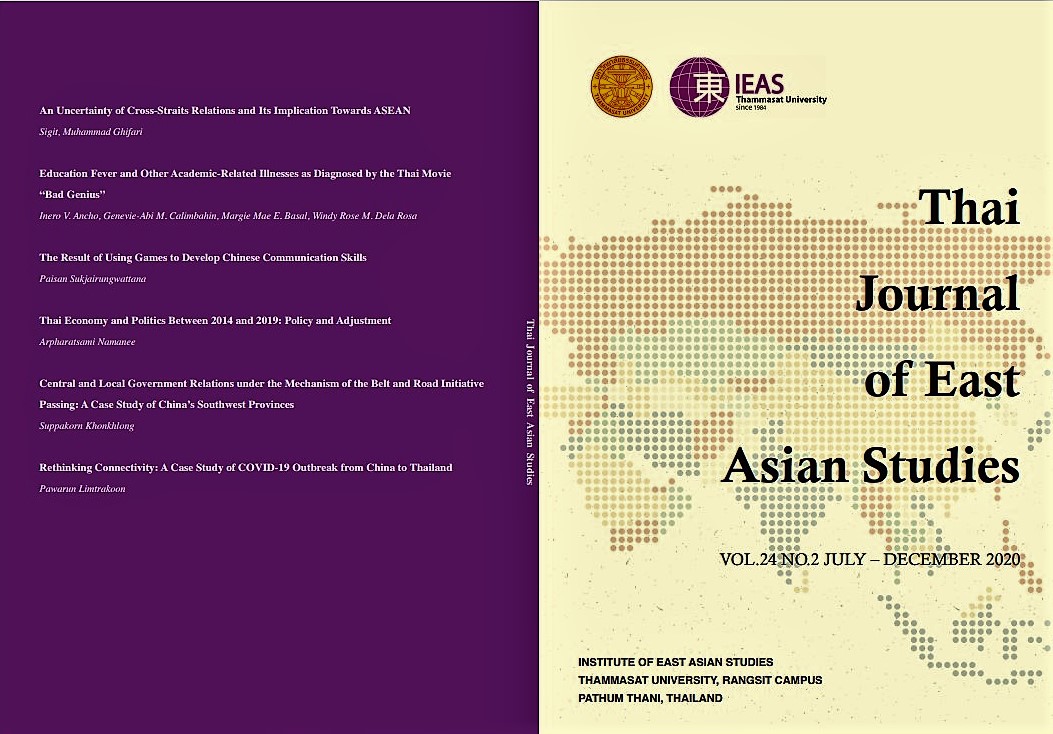ผลของการใช้เกมส์เพื่อพัฒนาทักษะการสื่อสารภาษาจีน
คำสำคัญ:
เกมส์, ทักษะการสื่อสาร, ความพึงพอใจ, การเรียนการสอน, ภาษาจีนบทคัดย่อ
การวิจัยครั้งนี้เป็นศึกษาผลของการใช้เกมส์เพื่อพัฒนาทักษะการสื่อสารภาษาจีน โดยมีวัตถุประสงค์ (1) เพื่อเปรียบเทียบผลสัมฤทธิ์ทางการเรียนของนักศึกษาก่อนและหลังการจัดการเรียนการสอนโดยใช้เกมส์ในชั้นเรียนภาษาจีน (2) เพื่อประเมินความพึงพอใจของนักศึกษาต่อการจัดการเรียนการสอนโดยใช้เกมส์ในชั้นเรียนภาษาจีน จำนวน 35 คน สถิติที่ใช้ในการวิเคราะห์ข้อมูล ค่าร้อยละ ค่าเฉลี่ย และ ค่าส่วนเบี่ยงเบนมาตรฐาน การใช้การทดสอบค่าที ผลการศึกษาพบว่า คะแนนทดสอบภาษาจีนของนักศึกษา จากคะแนนเต็ม โดยคะแนนก่อนสอบ มีค่าเฉลี่ย เท่ากับ 16.51 ส่วนเบี่ยงเบนมาตรฐาน เท่ากับ 1.01 คะแนนหลังสอบ มีค่าเฉลี่ย เท่ากับ 27.77 ส่วนเบี่ยงเบนมาตรฐาน เท่ากับ 1.73 ค่า T-test แบบ Pairs sample test เท่ากับ -6.638 แสดงว่า การจัดการเรียนการสอนโดยใช้เกมส์ในชั้นเรียนภาษาจีนมีผลทำให้นักศึกษามีผลสัมฤทธิ์หลังเรียนสูงกว่าก่อนการเรียน อย่างมีนัยสำคัญทางสถิติที่ระดับ 0.05 ด้านปัจจัยนำเข้าของความพึงพอใจของนักศึกษาต่อการจัดการเรียนการสอนโดยใช้เกมส์ในชั้นเรียนภาษาจีน มีค่าเฉลี่ยเท่ากับ 3.73 ส่วนเบี่ยงเบนมาตรฐาน เท่ากับ 0.67 ด้านกระบวนการของความพึงพอใจของนักศึกษาต่อการจัดการเรียนการสอนโดยใช้เกมส์ในชั้นเรียนภาษาจีนโดยรวมอยู่ในระดับมาก มีค่าเฉลี่ยเท่ากับ 4.23 ส่วนเบี่ยงเบนมาตรฐาน เท่ากับ 0.64 ด้านผลผลิตของความพึงพอใจของนักศึกษาต่อการจัดการเรียนการสอนโดยใช้เกมส์ในชั้นเรียนภาษาจีนโดยรวมอยู่ในระดับมาก มีค่าเฉลี่ยเท่ากับ 4.27 ส่วนเบี่ยงเบนมาตรฐาน เท่ากับ 0.59
Downloads
เอกสารอ้างอิง
พงศธร มหาวิจิตร (2560). การเรียนกระตุ้นความคิดนวัตกรรมการเรียนรู้จากฟินแลนด์ภาควิชาการศึกษาคณะศึกษาศาสตร์มหาวิทยาลัยเกษตรศาสตร์. วารสาร สสวท 46(409),40-45.
ภาวินี กลิ่นโลกัย (2553). การพัฒนากิจกรรมการเรียนรู้โดยใช้เกมเพื่อพัฒนาผลสัมฤทธิ์ทางการเรียนกลุ่มสาระการเรียนรู้ภาษาไทย ของนักเรียนชั้นประถมศึกษาปีที่ 1โรงเรียนบ้านเกาะ สำนักงานเขตมีนบุรี. วารสารศึกษาศาสตร์ ฉบับวิจัยบัณฑิตศึกษา มหาวิทยาลัยขอนแก่น 4 (ฉบับพิเศษ), 119-127.
เมธี ปิลันธนานนท์ (2541). รูปแบบการเรียนรู้ของนักศึกษาระดับบัณฑิตศึกษา. วารสารศรีปทุม 1(1), 42-45.
สำเนา ศรีประมงค์ (2547). การศึกษาผลการใช้เกมคำศัพท์ประกอบการสอนทีมีต่อความคงทนในการเรียนรู้คำศัพท์ ภาษาอังกฤษของนักเรียนชั้นประถมศึกษาปีที่5 โรงเรียน อัสสัมชัญระยอง. (วิทยานิพนธ์ปริญญาศิลปศาสตรมหาบัณฑิต). กรุงเทพฯ: มหาวิทยาลัยศรีนครินทรวิโรฒ.
สือ ยี่ (2550). ผลการสอนโดยใช้เกมที่มีต่อความสามารถในการพูดภาษาจีนของนักศึกษามหาวิทยาลัยราชภัฏนครสวรรค์. (วิทยานิพนธ์ปริญญานิพนธ์ครุศาสตรมหาบัณฑิต) มหาวิทยาลัยราชภัฏนครสวรรค์. นครสวรรค์: มหาวิทยาลัยราชภัฏนครสวรรค์.
หยาง ตัน (2553). การพัฒนาชุดกิจกรรมการเรียนภาษาจีนขั้นพื้นฐาน สำหรับนักเรียนชั้นมัธยมศึกษาปีที่ 4 (วิทยานิพนธ์ปริญญานิพนธ์การศึกษามหาบัณฑิต) คณะศึกษาศาสตร์ มหาวิทยาลัยบูรพา. ชลบุรี: มหาวิทยาลัยบูรพา.
อภิรดา นิยมวิทยาพัน (2556). การใช้เกมในการเรียนรู้คำศัพท์ภาษาอังกฤษของนักเรียนชั้นมัธยมศึกษาปี ที่ 1 ของโรงเรียนมัธยมวัดใหม่กรงทอง ในจังหวัดปราจีนบุรี. การประชุมวิชาการในโอกาสครบรอบ 25 และการประชุมเสนอผลงานวิจัยระดับบัณฑิตศึกษา. 17 ตุลาคม 2556 ณ Digital Multimedia 25 ปี วิทยาลัยวิศวกรรมศาสตร์. กรุงเทพฯ: มหาวิทยาลัยรังสิต.
Angelo, T. A. and Patrical C. P. (1993). Classroom assessment techniques. San Francisco: Jossey-Bass Publishers.
Dobson Julia (1998). “Try One of My Game,” Forum. 8 (3): 9-17.
Gronlund, N. E. and Linn R. L. (1990). Measurement and Evaluation in Teaching (6th ed.). New Jersey: Prentice Hall Inc.
Johnson, D.W. and Johnson R. T. (2002). Meaningful Assessment. New York: Allyn & Bacon Printed.
Lambert, D. L and David L. S. (2000). Understanding assessment: poses, perception, practice. London: Routledge/ Falme.
Oosterhof, A. C. (1996). Developing and using classroom assessments. New Jersey: Prentice-Hall Inc.
Reese, William L. (1999). Dictionary of philosophy and religion: Eastern and Western thought. New York: Lindenhurst.



